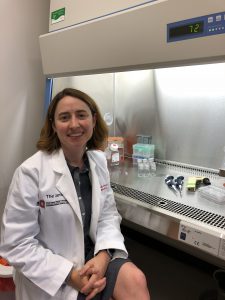The Soil for the Seeds: Investigating the Microenvironment of Acute Myeloid Leukemia
As a predoctoral student in the Integrated Biomedical Sciences Graduate Program at The Ohio State University in 2005, Bethany Mundy-Bosse, PhD, had plans to focus her graduate work on basic stem cell biology to enhance and expand her previous research experience in this field. “When I first started working in a research lab, I was working with stem cells,” recalls Mundy-Bosse, “with every intention of continuing on with basic stem cell biology.” However, after attending a course in immunology with renowned physician-scientist Michael Caligiuri, MD, she found herself completely fascinated by this field. It was this course that would ultimately motivate her to shift her career focus toward tumor immunology.
During this course, Caligiuri discussed the “seed and soil” theory of metastasis, first proposed by Stephen Paget in 1889, which holds that metastases are non-arbitrary biological events that develop only when the seeds (tumor cells) and the soil (the organ microenvironment) interact favorably. Caligiuri also introduced Mundy-Bosse and her classmates to the concept of natural killer (NK) cells, white blood cells whose main function is to kill tumor cells or cells infected with a virus.
“Dr. Caligiuri poetically described all the ways these cells are involved in preventing tumors, and how effective they can be at killing tumors, if given the right environment to work in,” recalls Mundy-Bosse. “As I started learning more about tumor immunology, a still somewhat rare field in 2005, I became fascinated with the untapped potential of these cells. I was 100 percent hooked on the potential for our immune system to not just allow people to live longer with cancer, but to actually completely weed out cancer cells and give people a truly cancer-free life.”
Mundy-Bosse, now an assistant professor of internal medicine at The Ohio State University College of Medicine, has since devoted her career to understanding this field, focusing her efforts on discovering how alterations in immune cell function can promote tumor growth and spread, as well as how the body’s natural defense system can be restored to prevent disease. In 2017, she was awarded the AACR-Incyte Corporation Career Development Award for Immuno-oncology Research to support her current research program focused on understanding the immuno-biology of acute myeloid leukemia (AML), the most common acute leukemia in adults. This disease, with a five-year survival rate of only 27.4 percent, is a cancer of the blood and bone marrow that can rapidly progress if not treated.
“This disease desperately needs novel therapies,” Mundy-Bosse says. “AML goes all over the body, so you have immune cells being born, developing, and trying to function, all with this disease stealing nutrients and altering their basic biology. Each of these different stages of immune cell development needs to be addressed when considering long-term immune-based therapeutics, and there is so much we still need to learn.”
AML inhibits the proper development of both precursor cells in the bone marrow into NK cells, as well as mature NK cells, effectively removing their ability to serve as immune surveyors. “This essentially paves the way for AML to take over the bone marrow and spill out into the rest of the body, completely unchecked by the immune system,” Mundy-Bosse explains. “Restoring NK cell recognition of AML would again allow these surveyors to do their job of killing cancerous cells.”
Mundy-Bosse believes that such restoration of NK cell function in AML patients would lead to the eradication of tumor cells, thereby keeping these patients cancer-free. However, she advises that before new immune-based therapies can be developed, we must first learn more about the microenvironment that supports AML’s ability to avoid immune detection.
“It is hard to know how to fix a problem if you do not understand what is broken,” she says. “In the past five years, we have seen these amazing responses to immune therapy in many types of cancer, but unfortunately, aside from a few exceptions, it doesn’t work for most patients.” According to Mundy-Bosse, this lack of efficacy among the larger population of cancer patients emphasizes the critical need to improve our understanding of how the microenvironment should be altered to improve the success of not only current, but also future, immune-based therapeutics.
As she continues this important work, Mundy-Bosse recognizes the considerable impact her AACR-Incyte Corporation Career Development Award has made on her burgeoning research lab. “I received this grant at a critical time in my career transition,” she recalls. “The funding from this award has allowed me to develop my own research program and begin my career as a faculty member.” She also credits this funding with enabling her to gather sufficient preliminary data to successfully apply for funding from the National Institutes of Health and put together her first senior authorship manuscript. “This is not an easy feat in this funding climate,” she says, “but I have the AACR and Incyte to thank for helping me launch my independent research career.”
Editor’s note: September is Leukemia/Lymphoma Awareness Month.




